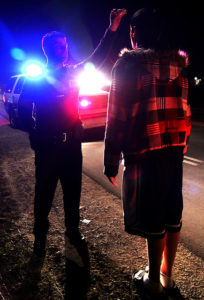To add to our growing list of legal blog samples, here’s another one for DUI-defense attorneys, dealing with field sobriety tests. In most states, field sobriety tests are voluntary. Here’s an evergreen post that deals with this often unknown fact.

Whenever a police officer suspects that you’re driving under the influence (DUI), they’ll pull you over and try to gather evidence to build a case against you. It’s important to remember that everything that a police officer does before and during a traffic stop is purely for the purpose of justifying an arrest.
Police officers have two key tools at their disposal, when it comes to investigating DUIs: Field sobriety tests, and a breathalyzer test. By asking you to perform either of these tests, law enforcement can get crucial evidence that you’ve been drinking.
However, there’s one important difference between a breathalyzer test and field sobriety tests: A breath tests is mandatory, while field sobriety tests are voluntary.
Field Sobriety Tests Are Voluntary
Field sobriety tests are voluntary because, in our state, if a police officer has probable cause to think that someone is drunk driving, “that person shall submit to and complete a test to determine an alcohol level and the presence of a drug or drug metabolite by analysis of blood, breath or urine.”
Notice that the test that you “shall submit to” is one that tests blood, breath, or urine. Field sobriety tests don’t deal with any of these things. Therefore, field sobriety tests are not something you have to submit to, making them voluntary.
Police Won’t Tell You That They’re Voluntary
However, police will never admit that field sobriety tests are voluntary if they pull you over. Instead, they’ll request that you step out of your vehicle – or sometimes flat out tell you to get out – and immediately instruct you on what to do for a field sobriety test.
Why a Field Sobriety Test Might Not Be a Good Idea
Field sobriety tests try to determine if you’re drunk by dividing your attention and making you perform multiple tasks at once. Drunk people have more trouble doing this than sober people do. However, that does not mean that sober people are necessarily good at these challenges, resulting in many completely sober drivers failing field sobriety tests.
Even worse, some of the field sobriety tests that are used are actually physically demanding, requiring you to stand on one leg, or perform a very specific turn on your toes. If you’ve been hurt in the past, aren’t very coordinated, or are over the age of 50, the result can be a failed field sobriety test and evidence that you’ve been driving under the influence.